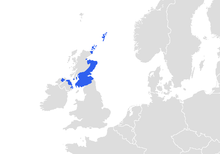Scots (language)
| Scots | |
|---|---|
| (Braid) Scots, Lallans | |
| Native to | United Kingdom, Republic of Ireland |
| Region | Scotland: Scottish Lowlands, Northern Isles, Caithness, Arran and Campbeltown Ulster (Ireland): Counties Down, Antrim, Londonderry, Donegal and Armagh |
| Ethnicity | Scottish people |
|
Native speakers
|
110,000–125,000 (1999–2011) 1.5 million L2 speakers (no date) In the 2011 census, respondents indicated that 1.54 million (30%) are able to speak Scots. |
|
Early forms
|
|
| Dialects | |
| Latin | |
| Official status | |
|
Official language in
|
None — Classified as a "traditional language" by the Scottish Government. — Classified as a "regional or minority language" under the European Charter for Regional or Minority Languages, ratified by the United Kingdom in 2001. — Classified as a "traditional language" by The North/South Language Body. |
|
Recognised minority
language in |
United Kingdom (Scotland and Northern Ireland)
|
| Regulated by | — Scotland: None, although the Dictionary of the Scots Language carries great authority and the Scottish Government's Partnership for a Better Scotland coalition agreement (2003) promises "support". — Ireland: None, although the cross-border Ulster-Scots Agency, established as a result of the Good Friday Agreement, promotes usage. |
| Language codes | |
| ISO 639-2 | |
| ISO 639-3 | |
| Glottolog | scot1243 |
| Linguasphere | 52-ABA-aa (varieties: |

Areas where the Scots language was spoken in the 20th century
|
|
Scots is the Germanic language variety spoken in Lowland Scotland and parts of Ulster (where the local dialect is known as Ulster Scots). It is sometimes called Lowland Scots to distinguish it from Scottish Gaelic, the Celtic language which was historically restricted to most of the Highlands, the Hebrides and Galloway after the 1500s. The language developed during the Middle English period as a distinct entity.
Because there are no universally accepted criteria for distinguishing a language from a dialect, scholars and other interested parties often disagree about the linguistic, historical and social status of Scots and particularly its relationship to English. Although a number of paradigms for distinguishing between languages and dialects do exist, these often render contradictory results. Broad Scots is at one end of a bipolar linguistic continuum, with Scottish Standard English at the other. Scots is often regarded as one of the ancient varieties of English, yet it has its own distinct dialects. Alternatively, Scots is sometimes treated as a distinct Germanic language, in the way Norwegian is closely linked to, yet distinct from, Danish.
A 2010 Scottish Government study of "public attitudes towards the Scots language" found that 64% of respondents (around 1,000 individuals being a representative sample of Scotland's adult population) "don't really think of Scots as a language", but it also found that "the most frequent speakers are least likely to agree that it is not a language (58%) and those never speaking Scots most likely to do so (72%)". In the 2011 Scottish census, a question on Scots language ability was featured.
...
Wikipedia
